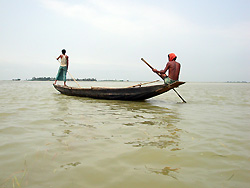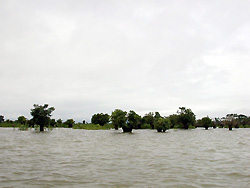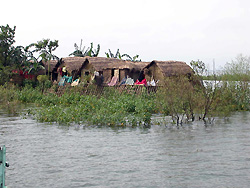In the context of natural resource management, it is argued that the degradation of local resources and the vulnerability of society to disaster are closely related to moral failure and the illegitimacy of the political regime in each historical stage. In short, the mismanagement of resources and natural calamities cannot simply be construed as the collapse of common property regimes or the failure of state control, but should be seen as the collapse of the state-society relationship. Consequently, ‘cultural politics’ that take place in the process of resource management projects can be described as the reconstruction of a new state-society relationship in the context of resource management. In my research, I will focus on ‘cultural politics’ in community-based wetland resource management programs in Bangladesh, and the reconstruction of the resource management regime on specific issues, namely representations of ‘community’ and resource distribution, knowledge process and reforming of resource use patterns, and the process of contestation and negotiation of rights to resource use and management. I will discuss these issues in the sense of a reconstruction of the resource management regime between state and society. (3) One of the purposes of my visit to Bangladesh was to find a site to conduct research. To find a proper site, I visited some areas in Bangladesh, especially those where SEMP (Sustainable Environmental Management Program), financed by UNDP, have been implemented. The program areas are located in the districts of Rajshahi, Satkhira, Sunamganj, and Maulvi Bazaar. Different Gos (governmental organizations) and NGOs (non-governmental organizations) are implementing these programs, which are administrated by the Ministry of Environment and Forest of Bangladesh.
In Maulvi Bazar, wildlife conservation is conducted in one small forest adjacent to a haor. In the process of this program, I have seen different actors carry out negotiations and compromises to defend their own interests. Since Bangladesh’s independence as East Pakistan, there have been conflicts between government and the community on the proprietary rights of this small forest. On one hand, local people claim that Zamindar, the local landlord, gave the forest away to the community before independence, while on the other, the government claims that the lands once owned by Zamindar were registered as government lands in 1956, when the land reform was carried out, and that the land wherein the forest is located is no exception. In addition to this conflict, there are two other important aspects that should be addressed. One is that a shrine of an Islamic saint and a graveyard for the community are located in the forest. The other is that at the outset of SEMP, people in the area looked at the project with suspicion, and refused to accept it. Looking at how the goal of wildlife conservation has been reached, as far as can extrapolated, I can see that the various actors operated with different intentions and strategies. NGOs had to take recourse to multiple activities of various scopes in this area to implement SEMP; the government approved the program in order to claim authority over the land. The local people recognized that to ensure their actual rights to manage this forest, they would have to avoid registering their village committee as a CBO with the local government so that they could be free from government control. This example shows that a project cannot always control the people as a ‘project of control,’ and therefore that one can assume that a variety of actors will contest and negotiate for rights to resource use and management in different ways. In my next field research, I will examine how these different actors contest the meanings of their resources in the context of social relationships; how they rework the project; how they make decisions on resource use and management; and consequently, how they reconstruct a resource management regime in terms of wetland resource management. |



 21st Century COE Program
-Aiming for COE of Integrated Area Studies-
21st Century COE Program
-Aiming for COE of Integrated Area Studies-